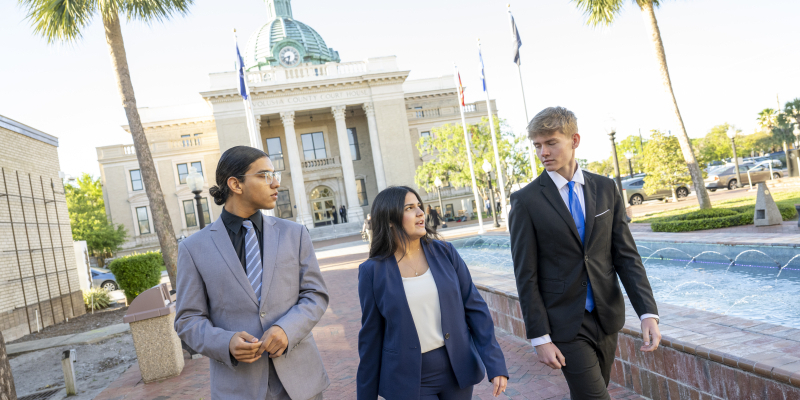
Frequently Asked Questions
If you join Mock Trial, you'll have fun competing at the highest levels, spending time with amazing people, and challenging yourself in a way no other student organization can!
Absolutely. There is no need to have done mock trial – or even any other kind of public speaking activity – in order to try out. Many of our members had never done a mock trial before setting foot on Stetson's campus.
We practice two to three times a week for around three hours each practice. Both the time and day of the week are subject to change based on class schedules. As we approach different competitions, our practices will be prolonged, or added to ensure our success as a program.
Anyone who likes public speaking, analytical thinking within a framework of rules, or articulately altering a pre-prepared outline on their feet would make an unbelievable attorney, regardless of previous mock trial experience. Attorneys need to know how to construct a strong plan for trial, follow that plan during the trial and recover and adapt quickly if that plan should fall through. There is no experience necessary to be an attorney. Some of our best mock trial lawyers started in college. Try out!
The best witnesses are good actors who can play a character, but who also understand how a trial works. Did you make up characters when you were little? Can you impersonate anyone around you? Do you act? Are you a good analytical thinker? Do you have a great accent? Again, no experience is necessary. Try out!
The Stetson Mock Trial Association begins its season in August, holding tryouts. During the fall, teams develop their case theory, create their case materials, and learn to work together as cohesive units. Throughout the fall, the program sends its teams to a variety of invitational tournaments hosted by various universities. The results of these tournaments do not have an effect on national standings but are good practice for official competition. The regular season begins in late January to February, when Stetson Mock Trial attends the regional competition. Based on the results of those competitions, the program proceeds to the Open Round Championship Series (ORCS).
High school mock trial programs do not allow teams to choose which witnesses they will call. Case writers create six witnesses and specify which three are for the defense and which three are for the plaintiff/prosecution. In college, the case-writers develop somewhere around ten different witnesses and allow each side to choose which three of these witnesses they will call in the minutes before a trial. With this setup, opposing sides can strategize to “steal” the witnesses their competitors might want. For this reason, every team needs extensive backup plans and a lot of improvisational ability. Thinking on your feet is one of the best parts of a mock trial.
How to perform as a witness also differs from high school to college. Many high school programs have regulations that prohibit witnesses from using costumes or accents. In college, not only do these regulations not exist, but it is almost a requirement that every witness transforms into a character that the judge will remember and like. Accents, costumes, and one-liners make witnesses entertaining and fun to play.
The way roles are divided in college mock trials can differ from high school as well. In high school, there can often be as many as six lawyers on a side, with each one receiving a single role. In college trials, there are only three attorneys per side, so each attorney must perform a direct and cross-examination, and two attorneys give statements.
Of course. Our members are involved in a wide variety of other organizations and activities. Current members are involved with programs such as Greek Life, Relay for Life Committee, Student Government Association, F.O.C.U.S. staff, Phi Alpha Delta Pre-Law Fraternity, Student Ambassadors, Omicron Delta Kappa, Psi Chi, and several other student organizations and social clubs. Mock Trial is a heavy time commitment, but our members always find a way to balance their schedules.
Of course! While competitions do take place in a courtroom setting, mock trial develops analytical, communication, and acting skills that are transferable to a variety of concentrations and careers. Members of the team have concentrations in history, communication, sociology, economics, and political science.